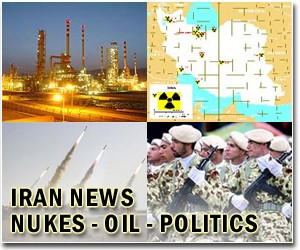 |
US Secretary of Defense Robert Gates said Tuesday that military action would not stop Iran's nuclear program and instead would only make it "deeper and more covert." Gates told a conference that military action would offer only a "short-term solution" to the thorny issue of Iran's nuclear program.
Western nations have accused Tehran of seeking to develop a nuclear weapon, something Iran vehemently denies.
Military action against the Iranian government, which has refused global calls to rein in its suspect nuclear enrichment program, would "bring together a divided nation, it will make them absolutely committed to obtaining nuclear weapons," the US defense chief said.
Under that scenario, Iran's secret nuclear efforts "would just go deeper and more covert," said Gates.
He said he believed diplomacy and economic pressure were the best way to try to persuade Tehran -- which already has been slapped with a series of UN and international sanctions -- to abandon its nuclear project.
"The only long-term solution to avoiding an Iranian nuclear weapons capability is for the Iranians to decide it's not in their interest," Gates said.
"Everything else is a short-term solution -- is a two-to-three year solution."
He said there were signs that the latest economic sanctions had hit Iran hard and created tensions between the country's supreme leader and the president, Ahmadinejad.
"We even have some evidence that (Tehran's supreme leader Ayatollah Ali) Khamenei now is beginning to wonder if (Iranian President Mahmoud) Ahmadinejad is lying to him about the impact of the sanctions on the economy," he said.
"I personally believe they are intent on acquiring nuclear weapons, but also the information we that have is that they've been surprised by the impact of the sanctions," Gates said, adding that the measures "have really bitten much harder than they anticipated."
earlier related report Iran yet to agree with world powers on nuclear talks restartTehran (AFP) Nov 16, 2010 - Iran and world powers have yet to agree on the venue and agenda for a resumption of nuclear talks planned for December 5, the foreign ministry said on Tuesday.
"The consultations are ongoing," foreign ministry spokesman Ramin Mehmanparast told reporters. "We have reached an agreement on the date. For the rest, once there is an agreement we will announce it."
On Friday, EU diplomacy chief Catherine Ashton agreed to resume long-stalled nuclear talks between Tehran and world powers on December 5, a date proposed by Iran, but with the venue either in Switzerland or Austria.
Ashton represents Britain, China, France, Russia, Germany and the United States in the talks aimed at allaying Western concerns that Iran's nuclear activities are masking a weapons drive under the guise of a civilian programme.
Tehran has repeatedly denied the charge.
The two sides decided in September to resume talks suspended since October 2009, and Tehran proposed Istanbul, considered an ally of Iran on the nuclear file, as the venue. Iran has yet to respond to the new proposed venues.
The two sides also differ on the agenda.
The world powers want to focus on all aspects of the Iranian nuclear issue, while Tehran has ruled out raising the issue of a fuel swap and wants to discuss regional security such as Israel's suspected nuclear arsenal.
"If the goal of both parties is to achieve cooperation and to solve many global problems, then the place and the framework of the talks can be agreed on," said Mehmanparast.
"We believe these discussions will take place ... and we hope they will bear fruit," he added.
The discussions were broken off after Iran in October 2009 rejected a proposal by the world powers to exchange nuclear fuel, in an arrangement aimed at "restoring trust."
The international community has since stepped up economic and political measures against Iran, and the Security Council in June slapped Tehran with a fourth set of UN sanctions.
The West is particularly concerned about Islamic republic's uranium enrichment programme, which it suspects of having military aims.
Low-enriched uranium is used for civilian purposes but it can also be used to make atomic weapons if the degree of enrichment is hiked up to more than 90 percent.
Mehmanparast, on calls to suspend uranium enrichment, reiterated Iran's line that Tehran would "never abandon its rights."








No comments:
Post a Comment